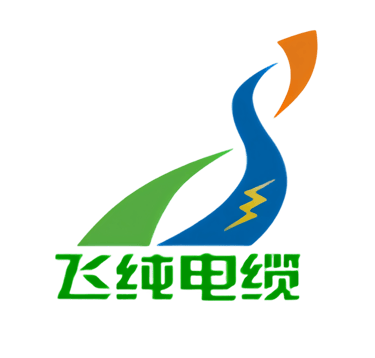📞+86 153 7530 2641 📧 hongjing.Wang@feichuncables.com

High-Performance Medium-Voltage Flexible Reeling Cable with Fiber Optics for Extreme Mechanical Stress: Ideal for Open-Pit Mines, Harbors, and Stockyards
Discover the (N)TSCGEWOEU-SR FO medium-voltage flexible reeling cable with integrated fiber optics, engineered for high and extreme mechanical stress in open-pit mines, harbor cranes, shipyards, and stockyard stackers/reclaimers. Key features include ±25°/m torsional resistance, oil and weather protection, and compliance with CPR 305/2011 and DIN VDE 0250-813.
hongjing.Wang@Feichun
8/5/20258 min read

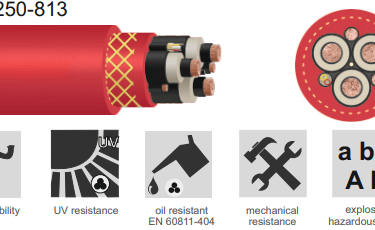
Introduction
Overview of Flexible Medium-Voltage Reeling Cables
In today's industrial landscape, the demand for robust power transmission solutions that can withstand extreme operational conditions has never been greater. Flexible medium-voltage reeling cables represent a critical infrastructure component for heavy industry applications where conventional static cables simply cannot meet the mechanical and electrical demands. These specialized cables must deliver reliable power transmission while enduring continuous flexing, twisting, and environmental stresses that would quickly degrade standard power cables.
The evolution of flexible reeling cable technology has been driven by increasingly sophisticated industrial equipment requiring both high-power electrical supply and real-time data communication capabilities. Modern mining operations, port facilities, and heavy industrial sites demand cables that can simultaneously provide medium-voltage power distribution and high-speed fiber optic data transmission, all while maintaining structural integrity under extreme mechanical stress conditions.
Importance of High Mechanical and Torsional Resistance
The critical importance of superior mechanical properties in flexible reeling cables cannot be overstated. In applications such as open-pit mining, where massive excavators and material handling equipment operate continuously under harsh conditions, cable failures can result in catastrophic downtime, safety hazards, and significant financial losses. Similarly, harbor crane operations and stockyard stacker/reclaimer systems require cables that can endure thousands of reeling cycles while maintaining electrical integrity and data transmission quality.
Torsional resistance becomes particularly crucial when cables are subjected to complex multi-directional movements. The ability to withstand ±25°/m torsional stress ensures that cable cores remain properly positioned and insulated, preventing premature failure due to conductor displacement or insulation breakdown. This mechanical resilience directly translates to reduced maintenance costs, improved operational reliability, and enhanced safety performance across demanding industrial applications.
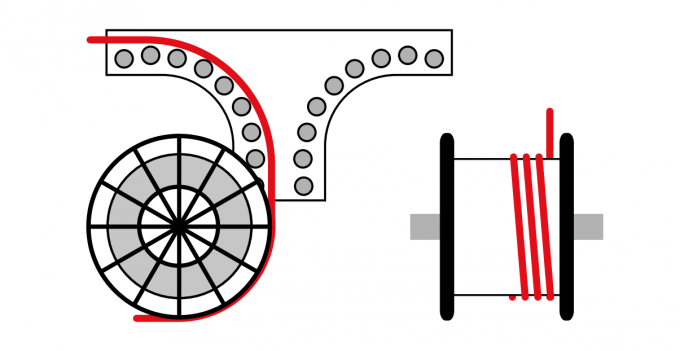

Model (N)TSCGEWOEU-SR FO Specifications
Voltage Ratings and Electrical Performance
The (N)TSCGEWOEU-SR FO medium-voltage flexible reeling cable with integrated fiber optics is available in six distinct voltage configurations, each engineered to meet specific industrial power distribution requirements:
3.6/6 kV Configuration: Designed for lower medium-voltage applications, this variant offers maximum permissible operating voltages of 4.2/7.2 kV in AC systems and 5.4/10.8 kV in DC systems. The configuration is ideal for smaller industrial equipment and auxiliary power distribution systems.

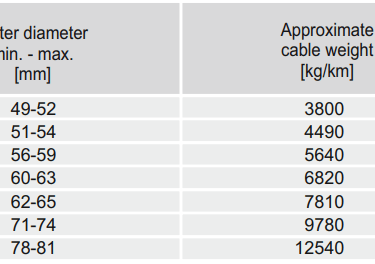
6/10 kV Configuration: A versatile option supporting maximum operating voltages of 4.2/7.2 kV AC and 9/18 kV DC, this variant serves as the backbone for medium-scale industrial operations requiring reliable power transmission with integrated communication capabilities.

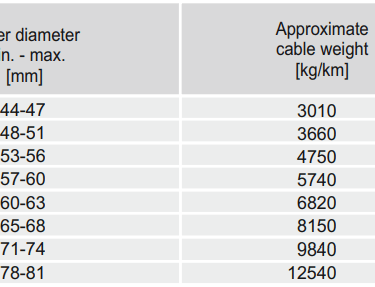
8.7/15 kV Configuration: Engineered for higher power transmission requirements, supporting maximum operating voltages of 10.4/18 kV AC and 13.5/27 kV DC. This configuration excels in large-scale mining operations and heavy industrial applications.

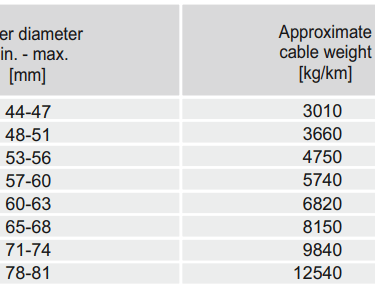
12/20 kV Configuration: Offering robust power transmission capabilities with maximum operating voltages of 13.9/24 kV AC and 18/36 kV DC, this variant is specifically designed for high-power industrial equipment requiring exceptional reliability.

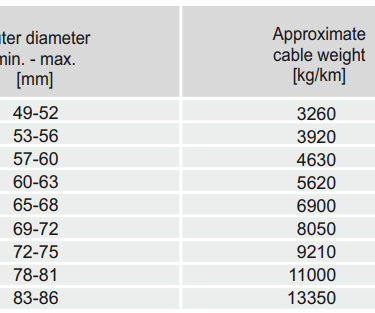
14/25 kV Configuration: Advanced medium-voltage solution supporting maximum operating voltages of 20.8/36 kV AC and 22.5/45 kV DC, ideal for the most demanding industrial applications.

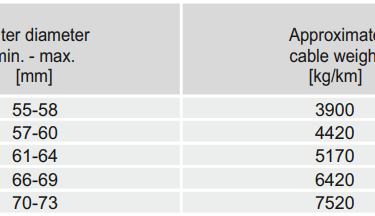
18/30 kV Configuration: The highest voltage rating available, supporting maximum operating voltages of 20.8/36 kV AC and 27/54 kV DC, designed for critical high-power transmission applications in extreme environments.

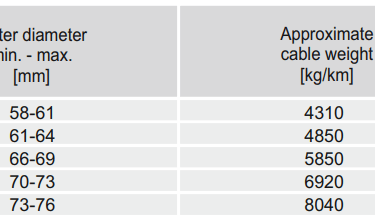
Fiber Optic Configurations and Data Transmission Capabilities
The integrated fiber optic system represents a significant advancement in industrial cable design, providing high-speed data transmission capabilities alongside power distribution. The cable accommodates multiple fiber configurations to meet diverse communication requirements:
Single-mode E9/125 Fiber: Compliant with ITU-T G.652 D standards, these fibers offer exceptional long-distance transmission capabilities with maximum attenuation values of 0.5 dB/km at 1310 nm and 0.3 dB/km at 1550 nm. Single-mode configuration is ideal for applications requiring high-bandwidth, long-distance communication between control systems and field equipment.
Multimode G50/125 Fiber (OM2-OM4): Meeting ITU-T G.651 standards, these fibers provide versatile communication solutions with maximum attenuation of 3.0 dB/km at 850 nm and 1.0 dB/km at 1300 nm. This configuration excels in applications requiring high-speed local area networks and equipment monitoring systems.
Multimode G62.5/125 Fiber: Offering maximum attenuation values of 3.5 dB/km at 850 nm and 1.5 dB/km at 1300 nm, this fiber type provides cost-effective communication solutions for shorter-distance applications while maintaining excellent performance characteristics.
The fiber configurations are available in 12-fiber or 2x12-fiber arrangements, providing flexibility for complex communication architectures requiring redundancy and multiple data channels.
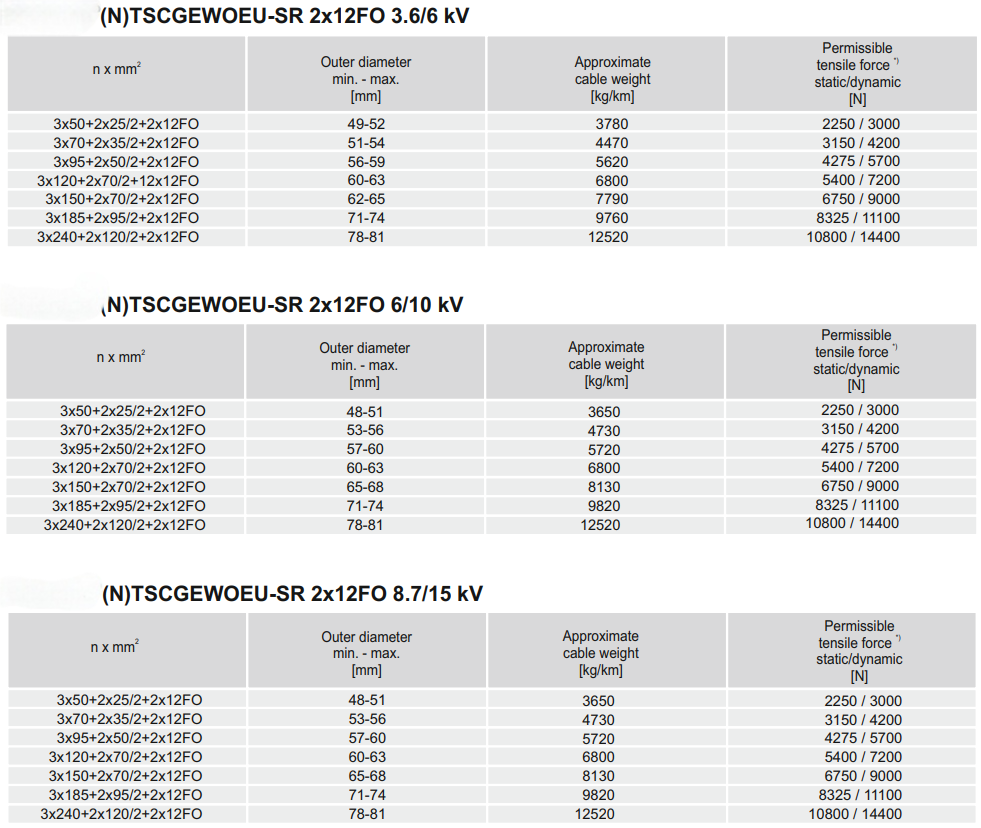

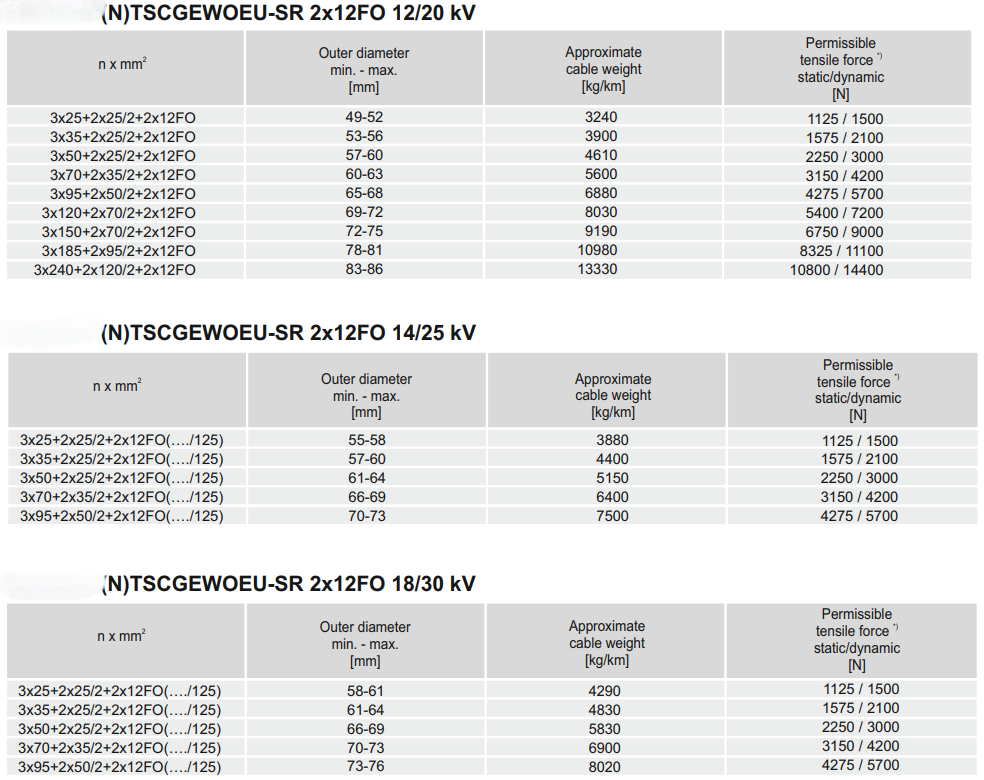

Key Features and Standards Compliance
CPR 305/2011 and DIN VDE 0250-813 Compliance
The (N)TSCGEWOEU-SR FO flexible reeling cable demonstrates unwavering commitment to international safety and performance standards. Compliance with CPR 305/2011 (Construction Products Regulation) ensures that the cable meets stringent European requirements for fire safety, mechanical properties, and environmental performance in construction applications.
DIN VDE 0250-813 compliance specifically addresses the unique requirements of flexible power cables designed for continuous reeling operations. This standard encompasses critical performance parameters including conductor construction, insulation properties, mechanical strength, and long-term reliability under dynamic loading conditions.
Fire Behavior and Chemical Resistance
Fire safety represents a paramount concern in industrial environments, particularly in confined spaces such as mine shafts and shipboard installations. The cable's fire behavior compliance with IEC 60332-1-2 standards ensures controlled flame propagation characteristics, minimizing fire spread risk and providing crucial evacuation time in emergency situations.
Oil resistance testing according to IEC 60811-404 standards validates the cable's ability to maintain structural integrity when exposed to industrial lubricants, hydraulic fluids, and petroleum-based contaminants commonly encountered in heavy industrial environments. This chemical resistance directly contributes to extended service life and reduced maintenance requirements.
Environmental Protection and Weather Resistance
The cable's comprehensive environmental protection capabilities enable unrestricted use in both indoor and outdoor applications. Advanced weather resistance properties provide protection against ozone degradation, UV radiation exposure, and moisture ingress, ensuring consistent performance across diverse climatic conditions.
Temperature performance ranges from -50°C to 80°C for fixed installations and -30°C to 80°C for reeling operations, accommodating extreme environmental conditions encountered in arctic mining operations, desert installations, and marine environments.
Superior Torsional Stress Capability
The ±25°/m torsional stress capability represents a defining characteristic of the (N)TSCGEWOEU-SR FO cable design. This exceptional torsional resistance enables the cable to withstand complex multi-directional movements without compromising electrical integrity or mechanical stability. The advanced core arrangement and specialized reinforcement construction ensure that individual conductors and fiber optic elements maintain proper positioning even under extreme twisting loads.
Mechanical Performance Excellence
Static and Dynamic Tensile Strength
The cable's tensile strength specifications reflect its engineered capability to handle demanding mechanical loads encountered in reeling applications. Static tensile forces ranging from 1,125 N to 14,400 N, depending on cable configuration, provide substantial safety margins for normal operating conditions. Dynamic tensile ratings, typically 33% higher than static values, account for the additional stresses imposed during active reeling operations.
Operational Parameters and Physical Characteristics
Maximum reeling speeds of up to 180 m/min accommodate high-speed industrial equipment while maintaining cable integrity. Bending radius specifications according to DIN VDE 0298-3 ensure proper installation practices that preserve long-term performance characteristics.
Cable diameters range from 44 mm to 86 mm, with weights varying from 3,010 kg/km to 13,350 kg/km depending on voltage rating and conductor cross-section. These physical parameters reflect the robust construction necessary for extreme mechanical stress applications while maintaining manageable installation and handling characteristics.

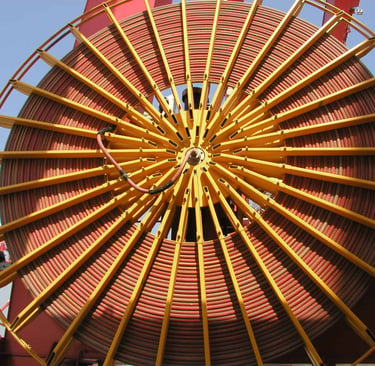
Typical Applications and Industry Solutions
Open-Pit Mine Material Handling Machines
Open-pit mining operations represent one of the most demanding applications for flexible reeling cables. Massive excavators, draglines, and conveyor systems require continuous power supply and communication capabilities while operating in environments characterized by extreme temperatures, abrasive dust, chemical exposure, and mechanical stress.
The (N)TSCGEWOEU-SR FO cable excels in these applications by providing reliable medium-voltage power transmission alongside high-speed fiber optic communication for equipment monitoring, remote control, and safety systems. The cable's superior torsional resistance and tensile strength enable it to withstand the complex movements of mining equipment while maintaining electrical and communication integrity.
Harbor and Shipyard Cranes
Port facilities and shipyards utilize various crane configurations requiring flexible power and communication cables capable of withstanding marine environments and continuous reeling operations. Container cranes, ship-to-shore cranes, and floating cranes impose unique mechanical stresses due to their operational characteristics and exposure to salt spray, humidity, and temperature variations.
The cable's weather resistance, oil resistance, and mechanical durability make it ideally suited for these maritime applications. The integrated fiber optic system enables advanced crane control systems, load monitoring, and predictive maintenance capabilities essential for modern port operations.
Stockyard Stacker/Reclaimer Systems
Coal, ore, and bulk material handling facilities employ stacker/reclaimer systems that traverse extensive stockyards while continuously loading and unloading materials. These systems require flexible cables capable of spanning hundreds of meters while withstanding environmental exposure and mechanical stress from material handling operations.
The (N)TSCGEWOEU-SR FO cable's exceptional mechanical properties and environmental resistance ensure reliable operation in these challenging applications, supporting both power transmission and sophisticated automation systems essential for efficient material handling operations.
Installation and Operational Considerations
Cable Guidance Systems and Reeling Configurations
Proper cable guidance systems are essential for maximizing the service life and performance of flexible reeling cables. Monospiral reel systems, cable chains, and festoon configurations each present unique mechanical requirements that must be carefully considered during installation planning.
The cable's minimum distance requirement of 20 × outer diameter for S-type directional changes ensures proper stress distribution and prevents premature fatigue failure. Adherence to these installation guidelines directly impacts long-term reliability and maintenance costs.
Power Transmission and Current-Carrying Capacity
Current-carrying capacity calculations according to DIN VDE 0298-4 account for the unique thermal characteristics of flexible reeling cables. De-rating factors must be applied based on installation conditions, ambient temperature, and reeling frequency to ensure safe and reliable operation.
The cable's 90°C maximum permissible conductor temperature and 250°C short-circuit temperature rating provide substantial thermal margins for demanding applications while ensuring personnel safety and equipment protection.

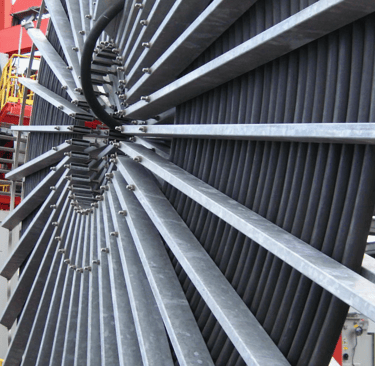
Customization Options and Engineering Support
Alternative Configurations and Special Requirements
The flexible nature of cable manufacturing enables customization of core configurations, cross-sections, and fiber optic arrangements to meet specific application requirements. Alternative designs incorporating cradle separators, additional ground conductors, or specialized sheathing materials can be developed to address unique operational challenges.
Engineering support includes application analysis, installation guidance, and performance optimization recommendations based on specific operational parameters and environmental conditions.
Conclusion
Summary of Benefits for High-Stress Environments
The (N)TSCGEWOEU-SR FO medium-voltage flexible reeling cable with integrated fiber optics represents a significant advancement in industrial power and communication cable technology. Its combination of superior mechanical properties, comprehensive environmental protection, and advanced fiber optic capabilities makes it the ideal solution for the most demanding industrial applications.
Key benefits include exceptional torsional resistance, comprehensive standards compliance, superior environmental protection, and integrated high-speed communication capabilities. These characteristics translate directly to reduced downtime, lower maintenance costs, improved safety performance, and enhanced operational efficiency across diverse industrial applications.
Technical Inquiries and Custom Solutions
For technical inquiries, application-specific engineering support, or custom cable configurations, professional consultation is available to ensure optimal cable selection and installation practices. Specialized requirements for higher tensile loads, alternative voltage ratings, or unique environmental conditions can be accommodated through custom design and manufacturing capabilities.
The investment in high-performance flexible reeling cables pays dividends through improved operational reliability, reduced maintenance costs, and enhanced safety performance in the world's most demanding industrial environments.
How to Reach Us
Get in Touch
SiteMap
Product Catalogue
Reeling Cable
Festoon Cable
Shore Power Cable
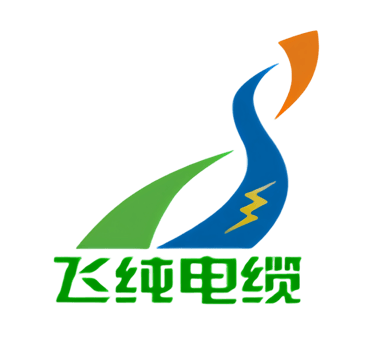



Scan to add us on WeChat
